Nearly half the planet's species could be wiped out by the end of this century, biologists fear
An IPCC report states the earth is on course to lose 20 to 40 per cent of its biodiversity by 2100

Your support helps us to tell the story
From reproductive rights to climate change to Big Tech, The Independent is on the ground when the story is developing. Whether it's investigating the financials of Elon Musk's pro-Trump PAC or producing our latest documentary, 'The A Word', which shines a light on the American women fighting for reproductive rights, we know how important it is to parse out the facts from the messaging.
At such a critical moment in US history, we need reporters on the ground. Your donation allows us to keep sending journalists to speak to both sides of the story.
The Independent is trusted by Americans across the entire political spectrum. And unlike many other quality news outlets, we choose not to lock Americans out of our reporting and analysis with paywalls. We believe quality journalism should be available to everyone, paid for by those who can afford it.
Your support makes all the difference.Leading biologists estimate nearly half of the planet’s species could be extinct by the end of the century unless urgent action is taken.
A major conference to be held at the Vatican is bringing together prominent biologists, ecologists and economists as part of the Biological Extinction conference in a bid to halt the mass extinction.
The three-day event, jointly sponsored by the pontifical academy of science and pontifical academy of social sciences, aims to find a solution to save the planet’s diversity.
A pamphlet on the workshop, due to start on 27 February, says: “The living fabric of the world is slipping through our fingers without our showing much sign of caring.”
Citing statistics from the Intergovernmental Panel on Climate Change (IPCC), the earth is on course to see 20 to 40 per cent of all biodiversity wiped out by the end of the 21st century.
And while there is a concerted effort to protect endangered species such as pandas, tigers and rhinos, other organisms are being overlooked.
The Biological Extinction statement said: “All of our food comes directly or indirectly from higher plants, of which there are an estimated 425,000 species.
"Tens of thousands of these have been cultivated for food at some time by some people, but at present, 103 of them produce about 90 per cent of our food worldwide, while three kinds of grain, maize, rice, and wheat, produce about 60 per cent of the total.
“We have detailed knowledge of perhaps only a fifth of the species of plants in the world, and a majority could be gone in nature by the end of the century we entered recently.
"The same can be said for other groups of organisms, on which we depend for many of our medicines, ecosystem services, atmospheric purification, carbon storage, and everything that really makes our lives possible.”
Pope Francis has declared the potential environmental crisis an urgent issue for the Catholic church, and the event is one of a series organised by the Vatican.
Some 26 participants are scheduled to take part in the event, including professor of population studies at Stamford University, Paul Erlich, whose views on population control have proved controversial.
He claims birth control should be more widely used to help keep numbers down, and in response to his involvement in the event a petition has been set up calling on the pope to withdraw his permission to speak.
He told The Guardian: “I believe they have about 11,000 signatures. The pope has not changed his mind, however.
“If you value people, you want to have the maximum number you can support sustainably.
“You do not want almost 12 billion living unsustainably on Earth by the end of the century – with the result that civilisation will collapse and there are only a few hundred survivors.”
UN projections estimate earth’s population will soar from 7.4 billion to 11.2 billion by next century, with the biggest growth in Africa.
Join our commenting forum
Join thought-provoking conversations, follow other Independent readers and see their replies
Comments